Difference Between Feeding A German Shepherd Adult & German Shepherd Puppy
German Shepherd puppies might have two main differences in their feeding requirements compared to full grown adults:
1. Puppies are still growing and need a different balance of nutrients and calories compared with adult dogs to help in this growing process. Puppy formulas for example may contain these specific nutritional requirements
2. At some stages, the type and texture of dog food a puppy can ingest might be limited based on what they can physically eat and swallow, and what their bodies can process properly
How Much Food For German Shepherd Puppy
There are different types of dog foods, including dry, wet, raw, and homemade food. These are the imperative aspects you need to consider before feeding your pup.
What Human Foods Can A German Shepherd Puppy Eat
Sometimes, your German Shepherd puppy deserves to be given a treat, and certain human foods are great options. There are proteins, veggies, fruits, carbs, and nuts eaten by humans that can you feed your puppy.
Proteins such as chicken, turkey, fish, eggs, and beef are great sources to help your puppy gain lean muscle and become strong.
Safe fruits for your puppy include blueberries, apples, strawberries, watermelon, coconut, bananas, and mangos. They are packed with minerals, vitamins, and antioxidants.
Safe veggies for your German Shepherd puppy include green peas, carrots, bell peppers, broccoli, and cucumber. Safe nuts for your puppy are peanuts but they should be plain. Safe carbs for your puppy include rice and sweet potatoes because they are easily digestible.
Read Also: German Shepherd Barking At Everything
What Human Foods Are Dangerous For A German Shepherd Puppy
Though your German Shepherd can enjoy human foods, some of them can cause harm and they should be avoided to avoid making your puppy ill.
Chocolate contains the theobromine toxin which causes health issues for your puppy these include rapid heartbeat, vomiting, diarrhea, seizures, and hyperactivity.
Avocado is another toxic food for your puppy because it contains persin which causes serious gastrointestinal issues when eaten. Other foods to avoid feeding your German Shepherd puppy include onions, raisins, grapes, fruit pits, macadamia nuts, and sometimes dairy.
Raw Feeding A German Shepherd Puppy

Raw feeding is usually okay for a GSD puppy but makes sure to consult your vet first on whats the best puppy food for them thats safe. After all, their immune system is still not as strong as that of an adult dog. This leads to possibilities of bacterial infection .
Be sure to choose your raw foods carefully and handle them with care. Make sure that they are also balanced in terms of protein and other nutrients. Make note of certain vitamins and minerals that your vet advised.
Recommended Reading: How Much Do You Feed German Shepherd Puppy
Best Diet For German Shepherds
German Shepherds grow to a large size dog breed between 60 to 90 pounds that is well muscled, slightly tapered, angular and longer than deep chested when fed a breed appropriate diet. Adult German Shepherds require 1,300 to 1,600 calories per day of high quality dog food for senior or less active dogs, and from 1,700 to 2,400 calories daily for active or working dogs.
If choosing a dry kibble diet, select a a quality formula like these Recommended Dog Food Brands with protein level around 24% and fat levels around 14%. Shepherds require quality protein which should come from a named meat source. Most premium kibble formulas work and Raw Dog Food is even better. Grain free kibble is another option but is very calorie dense and high in protein. We mention this with caution as some German shepherds seem to have difficulty tolerating grain free kibble and end up with soft and runny stool. For excellent insight on choosing a quality kibble to feed your German Shepherd, take a look at our Feeding Dry Dog Food section.
How Much Your Dog Should Eat Each Day
One of the first things you want to consider is what your dog needs to eat every day. And were not talking nutritionally. Were talking about Calories. Your dogs daily dietary needs are based on their resting energy requirement . This is the amount of Calories they burn on a daily basis, simply by breathing and being alive with no exercise.
For those of you into fitness, its similar to the human measurement of the basal metabolic rate the amount of Calories we burn each day simply by existing.
Also Read: At What Age do German Shepherds Baby Teeth fall out? Complete Teeth Care
Now, you may be wondering why were using a capital form of Calories. Theres a purpose! Calories are the traditional American way of counting calories: calories are the scientific measurement, while Calories are actually kilocalories . Its a small differentiation, but something worth keeping in mind.
Now, back to your dogs RER. Your dogs resting energy requirement is measured by measuring your dogs weight , raising that number to the ¾ power, and multiplying that by 70. In equation form, if your dog weighs Y pounds:
70*¾ = RER Calories
For example, if your dog weighs 20 kilograms , your dogs RER is approximately 662 Calories per day. How?
Your dogs RER = 70*¾ = 662 Calories
But it goes a step further than that. The RER is your dogs minimum amount of Calories they should eat each day. Any lower will obviously lead to weight loss. But anything over might not lead to weight gain. Why?
Also Check: What To Know About German Shepherd Breed
Eukanuba Puppy Mixed Grill Chicken & Beef Dinner And Canned Dog Food
This brand is well-known for quality dog food at an affordable price. The Eukanuba Puppy Mixed Grill Chicken & Beef Dinner and Canned Dog Food are exceptional for its beneficial properties and fulfillment rate. It promotes the healthy development of the digestive tract that in turn boosting their immune system. Your pup is going to be active and happy just like he should.
Nutritional Requirements For German Shepherd
As your puppy grows into adolescence, his nutritional needs will change. He no longer needs as many nutrients as when he was a puppy. At this age, your dog needs to eat adult formula food, and ideally, the food should also contain joint supplements to keep his arthritis under control.
Check at the dog food bag and see if there is wording such as Complete and balanced nutrition based on AAFCO guidelines for adult maintenance. Most German shepherds that are primarily pets will be fine eating an adult maintenance dog food formula.;
But suppose your German shepherd is a competition dog that actively participates in recreational or competitive canine sports. In that case, he will be better off with a formula for all life stages.
What if your dog is underweight? Consuming a high-calorie dog food together with some additional calories and protein such as cheese and egg might be the best answer. What if your dog is overweight? Then his diet should probably consist of food that provides good nutrition but with more fill so that he can meet all his nutritional needs and lose weight.
Also Check: German Shepherd Puppies Ears Stand Up At What Age
What Is A Gsds Nutritional Requirement
You can find more information about specific GSD nutritional requirements by
GSDs are carnivores, which mean they require a higher content of protein in their diet. This protein is what provides them energy and keeps them strong and healthy.
Protein also plays a vital role in your GSDs growth and it is recommended that a GSD get at least 22% of protein in its diet. It is best to feed pure protein to your GS instead of buying poor quality dog food that has corn syrup added as a;filler which is extremely harmful to;a dog.
The other nutritional requirement for a GS is fat.
Fat comes from protein and gives taste to a dogs meal. However, feeding too much fatty foods to your dog will be harmful to;its health. While on the other hand, if you feed too less fat, it will create a lot of skin problems for your German Shepherd.
Feeding a raw diet starting at an early age will help your pup grow faster. A raw meat diet is also helpful in strengthening the bones and fights several diseases in GSDs. If meat shops are hard to find in your area, US Wellness Meats menu selection offers free shipping for online orders across the state.
Fat content in a dogs diet also keeps its fur healthy. As a GS sheds a lot of fur throughout the year, it is extremely important that it is given the right amount of fat in its food. AAFCO recommended fat content for German Shepherd is 5%-8%.
That is what the science says, and in our experience, you should obey it.
Mixing In Fresh Ingredients
I add small portions of fresh components to my dry kibble for taste and flavor. But dont add more than a spoonful or two so your dog doesnt eat only the fresh ingredients and ignore the healthy kibble!
These components shouldnt make up over 10% of the meal to avoid them gaining excess wight.
GSD puppies enjoy eating:
- cooked and raw carrot pieces
- small dollops of unsweetened Greek yogurt
- scrambled and cooked eggs
- cooked, plain oatmeal without sweeteners
- fresh or frozen blueberries
- goats milk
If you want to know the best treats for German Shepherd puppies, pick one from this list of healthy German Shepherd treats that are tasty and nutritious.
Recommended Reading: How To Train A German Shepherd To Stay
What Nutrients Should A German Shepherd Puppy Have
Puppies require a proper diet to grow big and strong. One of the most important components of a newborn German Shepherds diet is Calcium so your dogs bones and joints can grow strong.;
Without strong bones and joints, your German Shepherd is even more prone to developing hip issues.;
Other important nutrients that a growing German Shepherd puppy should have include:;
- Proteins
- Fiber
Month Old German Shepherd Puppy Weight

When your GS puppy is 2 months old, you can expect him or her to weigh between 16 and 20 pounds, depending on the sex of the puppy. Females will always be a little lower on the scale than their male counterparts.
They are bigger dogs and do gain weight quicker than other breeds, but you still want to watch for signs of gaining too much too quickly or being underweight.
Recommended Reading: House Training A German Shepherd
How Fast Do German Shepherds Grow
German Shepherds are medium-large dogs and therefore grow at a fast rate over the first six to seven months leading up to adolescence. Adult German Shepherds are 22 to 26 inches tall and weigh 50 to 95 pounds.
Reputable weight charts suggest your German Shepherd puppy will have attained three-quarters of their final weight over these first six to seven months.;
This is A LOT of growing to do in a short amount of time when you brought your puppy home, it was probably only eight inches tall and weighed around 15 pounds.
By 12 to 15 months old, a German Shepherd is within an inch or less of their adult height.; By the 18 month mark, it will have reached 98% of its adult weight.;
Therefore, your male German Shepherd will be 23 to 25 inches tall and weigh 59 to 93 pounds by his first birthday.
What Nutrients Does A German Shepherd Puppy Need
German Shepherd puppies require a protein-rich diet to help them grow well and have sustained energy for their active lifestyle. Your puppy needs at least 22% protein in his diet. High-quality protein sources include fish, chicken, and beef.
According to our German Shepherd puppy feeding chart, your pup needs 5% of fat in their diet for healthy skin and coat. The recommended amount of carbs for your puppy is 5% to 8% and should come from fruits and vegetables such as peas and potatoes.
Your puppy also requires minerals, vitamins, probiotics, antioxidants, water, and omega fatty acids in their diet to ensure that their immunity is healthy.
You May Like: How To Trim A German Shepherds Nails
Calories For Gsd Puppy
| 12-week-old GSD puppy | 2000 calories |
Your new puppy will need to have their calorie needs met daily.
Many puppies need additional calories right before a growth spurt, then eat slightly less after the growth spurt. Its difficult to tell when the growth spurt begins, but you might notice that your puppy always seems hungry.
If you think your puppy is trying to eat everything, including his food bowl, then offer a small bit more food. If he seems slightly chubby or fat, then decrease the food by a small bit.
How Frequently Should You Feed Your Dog
Now, how do you feed your dog throughout the day? For humans, we know that the good idea is to eat three or more meals a day. This ensures that we consume our 2,000 daily Calories in smaller increments, meaning we wont overflow our stomachs and cause heartburn, indigestion, and more.
The same goes for your dog. If your dog is supposed to eat 600 Calories a day, you may want to hit the 3-meal standard. This would mean giving them 200-Calorie meals in the morning, afternoon, and at night.
But for those of us who work away from home or often arent around, every day, during the afternoon, its a good idea to separate their caloric intake into two meals a day: once in the morning, after your walk, and once at night, after your evening walk. In this case, this will be 300 Calories in the morning and at night.
For dogs who need more Calories per day, such as puppies and working dogs, you should try to stick to three meals a day, as it will aid in their overall digestion.
You May Like: How To Train Your German Shepherd Puppy Not To Bite
My Puppy Wont Eat What Should I Do
It can be worrying to see your GSD not have any appetite for anything. If your German Shepherd is a little on the timid side of eating, heres what you can do:
- Consider dog-safe seasonings to make the food bowl more flavor
- Mix both kibble and wet food so its both crunchy and flavorful
- Try swapping to a different food brand
- Consult your vet if the puppy hasnt been eating for more than 2 meals and looks sick
Feeding Your German Shepherd Puppy Raw Food
Feeding raw food to your German Shepherd puppy means that they are always eating wholesome, fresh, allergen-free foods that do not have any fillers and preservatives.
Raw food is easy to digest for your puppy and can help prevent Inflammatory Bowel Disease. Raw food means that your puppy does not eat unnecessary carbs allowing them to maintain a healthy weight.
However, uncooked raw foods can cause contamination with pathogens causing illness to your puppy. Unbalanced raw food can also affect the overall health of your puppy.
Raw foods such as muscle meat, edible bone, liver, vegetables, and fruits will ensure that your puppy is getting all the necessary nutrients. Consult with your vet to come up with raw diet recipes for your puppy.
Read Also: Who Would Win In A Fight German Shepherd Or Pitbull
How Much To Feed A German Shepherd Per Day
The correct amount of food is always a question of the weight, size and activity of a German Shepherd. It is therefore not possible to give a general answer. Basically, however, your German Shepherd should be given continuously increasing amounts of food until he is fully grown .
When eating dry food, the amount of food should increase from 250 grams to 480 grams by the age of six months. At the age of six to twelve months, from 480 grams to 550 grams, although you should maintain the latter amount as your dog ages.
When feeding with wet food or BARF, the amounts of food are often larger. By the age of six months, you should increase the amount of food from 850 grams to 1500 grams. At the age of six to twelve months from 1500 grams to 1700 grams, with the latter amount then being maintained again.
However, these values are only general values that you can adjust depending on the activity and general development of the dog. Since the German Shepherd generally tends to be overweight, this should be avoided at all costs, as it is very difficult for the dog to lose excess weight afterward.
You should reduce the feeding times at regular intervals from the puppy age until it is fully grown. A puppy can be fed up to four times a day, while one to two feedings a day is more recommended for an adult German Shepherd. As long as you keep an even interval between feeding times, the times are of secondary importance.
Feeding Time And Frequency

A normal German Shepherd feeds for ten to fifteen minutes. However, the duration can sometimes differ because older dogs eat lesser amounts of food.
Make sure you observe your dogs during their feeding times for any abnormalities.
Bloat is likely to affect dogs that feed faster. In such cases, we recommend investing in slow feeder bowls that help reduce the dogs feeding pace.
On the other hand, if your Shepherd eats slower than normal, ensure you take him to the vet he could be suffering from digestive problems or not, either way, visiting the vet is the only way to know.
Also Check: How To Grow Long Hair For German Shepherd